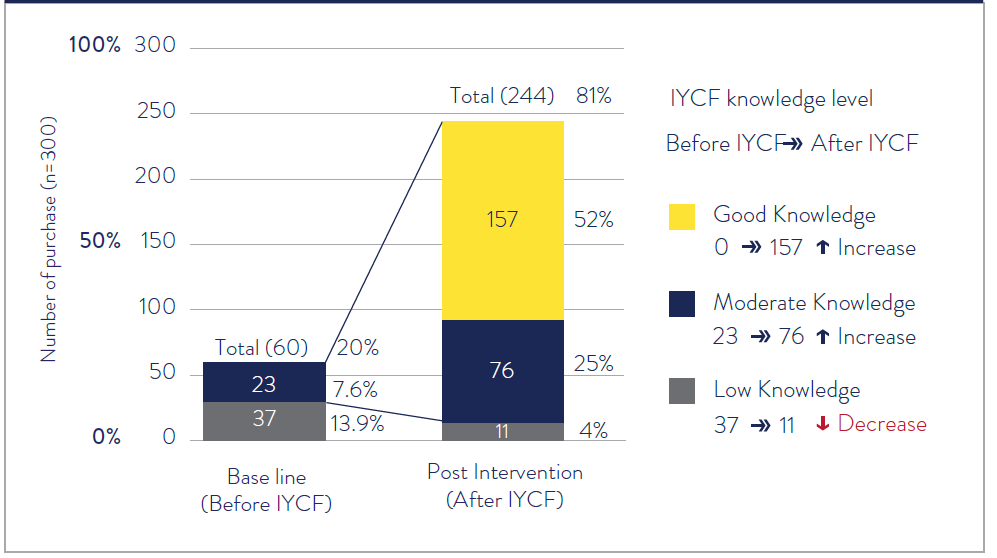Nutrition in the First 1000 Days
The First 1,000 days, from conception to 24 months, is a vital phase in a child’s growth, especially for brain development. Nutrition during this time has a lasting impact on physical health, cognitive development, and behaviour. For example, the brain records its highest growth rate and plasticity during this period, with tremendous implications for overall well-being, cognitive development and behavioral expression in later life. Poor nutrition can lead to irreversible consequences, such as stunting—a condition where chronic undernutrition hinders growth and development, affecting cognitive ability.
In Ghana, stunting has decreased from 33% in 1993 to 18% in 2022, thanks to joint efforts from the government, private sector, and development partners. While this is significant progress, Ghana’s national target of 14% by 2025 remains unmet. The Ghana Nutrition Improvement Project (GNIP), led by The Ajinomoto Foundation (TAF), has contributed significantly to this progress over the past decade..
GNIP and the fight against malnutrition in Ghana
Started in 2009, GNIP is focused on preventing malnutrition among infants and young children. It undertook product development of a protein and micronutrient nutrient powder (called KOKO Plus®) based on WHO guidelines for infant and young child nutrition (IYCN), conducted scientific efficacy studies that verified that KOKO Plus® is effective against stunting, and distribution model studies that evaluated delivery channel options for reaching the target population (children from 6 months old).
In the product development, to ensure sustainable production, due regard was given to the local food culture and local supply chains. This “localization” commitment emphasized the use of local raw materials for the manufacture of the product, the use of a local production facility and labour, and respect for the local food culture by making a sprinkle-type point-of-use supplement for traditional complementary foods. KOKO Plus® is a 15g powder supplement containing soybean flour, added lysine, and a mixture of vitamins and minerals. The product formulation has been published in the scientific literature. In 2018, the UN World Food Programme (WFP) registered KOKO Plus® as a “Nutritious Powder” in its food basket for Ghana.
Sustainable Access Through a Social Business
Modelmaking nutrient-dense complementary foods accessible is crucial for preventing malnutrition. GNIP’s approach emphasizes social business, with KOKO Plus® priced affordably (about 10 cents per sachet) and available in local stores near healthcare facilities. By employing local people along the value chain, GNIP strengthens supply chains, supports local livelihoods, and fosters sustainable health systems, contributing to the Sustainable Development Goals’ pledge to “leave no one behind.”
Nutrition knowledge is key to proper feeding. Caregivers’ knowledge influences food choices, preparation, and feeding practices, especially for young children. Recognizing this, TAF and the KOKO Plus Foundation (KPF) collaborated with the Ghana Health Service (GHS) to enhance caregiver education on optimal infant and young child feeding (IYCF). This partnership has produced co-developed, user-friendly materials for training health workers and educating caregivers. Through this social behaviour change communication (SBCC) activities, caregivers learn to select and prepare nutritious meals, with cooking demonstrations showing practical steps.
As of 2023, this collaboration has reached over 280,000 caregivers nationwide, helping them understand the importance of nutrient-dense foods. In 2019 alone, 1,200 caregivers participated in cooking demonstrations in a single district. Such initiatives contribute to a comprehensive approach, where knowledge translates into healthier food choices for children.
The Power of SBCC and Market-Based Nutrition Interventions
Combining SBCC and the market-based distribution of KOKO Plus® has proven effective in promoting sustainable nutrition practices. From 2019 to 2021, TAF/KPF, GHS, and WFP piloted this approach in Ghana’s Ashanti and Northern Regions. Findings included a notable increase in caregivers’ knowledge of IYCF, with 81% purchasing KOKO Plus® post-intervention compared to 60% at baseline. Importantly, children in the program had a 15% reduced incidence of anaemia, suggesting that increased knowledge led to intentional, nutrition-focused choices.
The willingness of caregivers to buy KOKO Plus® after receiving IYCF education highlights a crucial shift in mindset: an informed choice for nutritious options, which is instrumental in improving health outcomes. KOKO Plus® purchases serve as an indicator of caregivers’ commitment to enhanced nutrition, which supports improved child health and development.

Fig. 1: Link between caregiver knowledge of optimal infant and young child feeding (IYCF) practices and purchase of protein and micronutrient powder (KOKO Plus®) as a proxy for intentional purchase/selection of nutritious foods following nutrition education.
Expanding Impact and Scaling Up
Building on these successes, TAF/KPF, GHS, and WFP, with support from the Japanese government, began a second phase of the project in October 2021. This phase aims to reach 252,000 caregivers across 90 districts, promoting dietary diversity and preventing malnutrition by enhancing caregivers’ IYCF knowledge. The project encourages caregivers to use KOKO Plus® alongside locally available foods to improve children’s diet quality, fostering healthier futures for communities.
Conclusion
The Ghana Nutrition Improvement Project (GNIP), led by TAF, demonstrates that combining SBCC with market-based nutrition interventions can sustainably improve nutrition. By focusing on local resources, KOKO Plus® integrates well into Ghanaian food culture, promoting community ownership and long-term change. This model, relying on local supply chains and building caregiver knowledge, strengthens Ghana’s nutrition landscape, supporting better health and livelihoods.